Opinion

What does a trailblazing Episcopal priest, a lawyer whose work helped to shape the Brown v. Board of Education case, a founding member of the National Organization for Women (NOW), and a close friend of Eleanor Roosevelt all have in common?
They are all the same person. And My Name Is Pauli Murray, a new documentary from Amazon Studios, tells the fascinating story.

When we do not take care of the earth and allow powerful individuals or companies to plunder the land God has called good (Genesis 1), the people who are disproportionately impacted are the marginalized. This discrepancy between those who benefit and those who suffer highlights the way our society is structured to benefit oppressors at the expense of people who are poor, hungry, and disenfranchised.
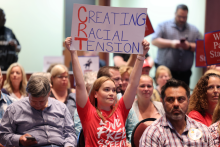
Perhaps you have seen the photos: Protesters at school board meetings holding signs that say “Stop Teaching Critical Racist Theory To Our Kids” or “I Am Not An Oppressor.” At the heart of these protests is opposition to teaching children about the United States’ shameful racial history — a history that repeats itself in systems and structures today. Many of these protests appeal to white parents’ fears that reckoning with our nation’s past sins and injustices will make their kids feel ashamed or that — in some twisted logic — this reckoning is itself “racist.” I’ve watched this growing campaign with anguish; I believe that cultivating a greater commitment to anti-racism within the next generation will empower our kids, not instill shame.

In the United States, white supremacy has made it impossible to see immigrants — but especially Haitian immigrants — as siblings who God commands us to love as though they were our neighbors. The U.S. has long resisted seeing Haitians not only as neighbors but as humans.
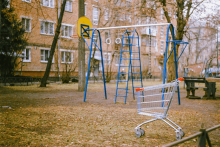
Last week, I told my colleagues that I never struggle to write these introductions. As you can predict, that meant this week’s introduction became extremely hard to write — as I deserve. The job of this introduction is to briefly whet your appetite, give you some connecting thread for our recommended stories, and maybe say something profound. I'm learning, however, that not every story needs a moral.

As a post-evangelical, I have no interest in rehabilitating Calvin’s ideas about double predestination or his justification for the execution of Michael Servetus. Nonetheless, I’m unwilling to cast Calvin and his theological legacy in exclusively negative terms; I believe that confronting racial injustice today actually requires recuperating Calvin’s infamous doctrine of “total depravity,” or a spiritual condition staining humanity from birth. Doing so can help us better understand why both progressive and reactionary heirs to Calvinist thought fall short — and how we might work to transform our fallen world instead.
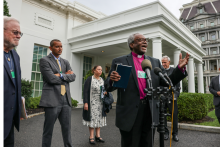
We've long argued that budgets — including our federal budgets — are moral documents. As Christians, we see this as a principle deeply rooted in scripture, including Luke's gospel, which explains that the two greatest commandments are to love God and love our neighbors (Luke 10:27). In that same passage, Jesus tells the parable of the Good Samaritan, a story about how our love for God and neighbor will be tested when our neighbors need us the most.

While living on a farm in Georgia, I signed up to take care of the goats. It was the only farm chore that allowed me to sleep in. The duties were odd and specific: I had to check their butts for signs of dysentery and their eyes — which, like sheep, can see in every direction at the same time — for infection. For weeks, I fed one goat a whole head of molasses-soaked garlic every day to cure her of mastitis. But mainly, I just counted them. Which is harder to do than you might imagine.
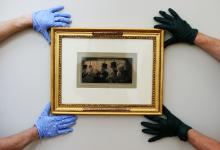
I have always been fascinated by heists. Maybe it was a youthful desire to sneak out and trick my parents (a desire that led me to failure every single time). Maybe is was the bravado and beauty of Neal Caffrey (played by Matt Bomer) on White Collar. Whatever it was, it was a fascination I put to rest as I matured to value integrity and simplicity.
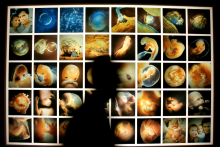
As a pastor I don’t ask, in this holy space of in between, when death is drawing near, theological questions about personhood or ensoulment. Neither do medical definitions of what marks life’s margins — heartbeats, breath, or brain function — occupy my concern. These are the gray edges of life.

Religious leaders should stop saying things like, “We must be good stewards of Creation” or “Our faith teaches us to protect the Earth” and instead getting comfortable saying things like: “ExxonMobil, BP, Shell, and other oil and gas companies are systematically destroying the planet — and financial giants like JPMorgan Chase, Bank of America, Wells Fargo, BlackRock, and Vanguard are bankrolling the destruction.”

My first foray into critical race theory was short-lived. I began by picking up Tommy J. Curry’s essay “Will the Real CRT Please Stand Up?” Three pages in I realized I did not know enough about race scholarship or CRT to appreciate his arguments.

On launch day, Meghan Fitzmartin, one of the writers for the issue (along with Joshua Williamson, Matthew Rosenberg, and Chip Zdarsky) tweeted, “My goal in writing has been and will always be to show just how much God loves you. You are so incredibly loved and important and seen…”

People in the United States have deeply conflicting understandings of our nation’s history: Are we a nation that guarantees “liberty and justice for all”? Or are we a nation that will continue to confine this promise to only certain Americans, falling short of realizing this promise for all? When we explore these questions, we start to see that many injustices that show up today have been with us since the nation’s founding.

Muslim detainees at Guantanamo are “indefinite prisoners of war,” held on suspicion of crimes they may or may not have committed. It would be easy to believe that Guantanamo is unique in regards to how it treats those the United States has deemed its enemies. But in reality, Guantanamo is an extension of the U.S. prison system.

What does it mean, now two decades past this traumatic event, to “never forget” 9/11? And why are we simultaneously encouraged to “move on from the past” when it comes to other great American tragedies, like the genocidal erasure of Indigenous peoples, or the horrific violence against Black people from chattel slavery through Jim Crow?

For those of us who have a relative, friend, or church member suffering from mental illness, I pray we turn away from the dangerous belief that mental illness is something that can be prayed away. Keep praying, but stop telling us to pray in an effort to rid ourselves of mental illness because it gives more power to our shame. In addition to your prayers, take action that helps.
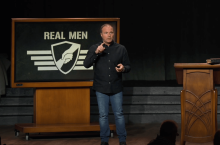
It would be too reductive — and too convenient — to suggest that Driscoll’s authoritarianism was solely a product of his brash, conservative theology. Catholic, mainline, and progressive Christians are not immune. Many forms of theology are susceptible to manipulation and abuse, and many others are intrinsically harmful — even if the damage isn’t always easy to discern.
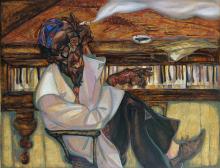
The only solution to this noisy world is good noise from people who are attuned to the world’s hurt.
